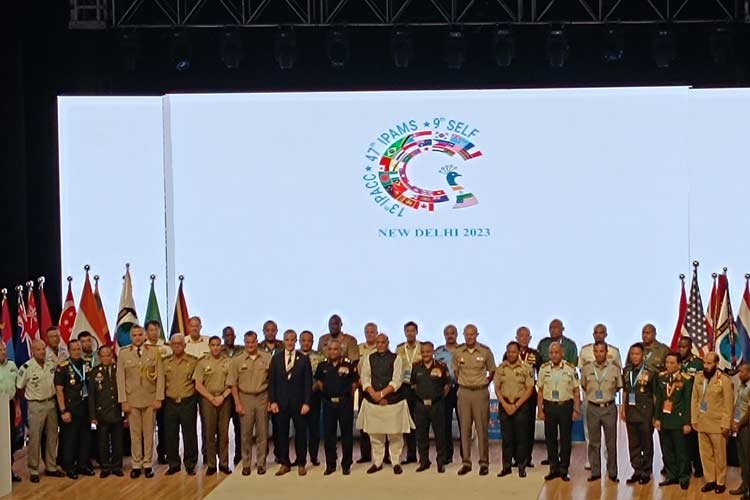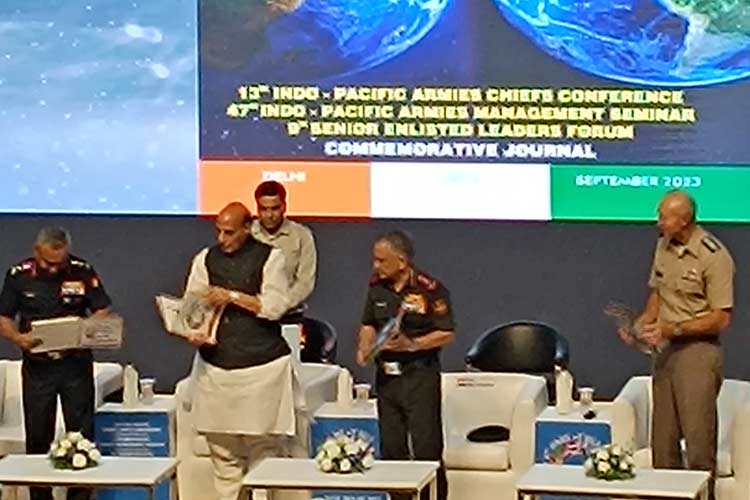
New Delhi: Amid ongoing LAC tensions and Taiwan dispute, the US Army Chief in India gave a strong message to China for its expansionist policies. General Randy George is on his maiden overseas visit to India to attend the 13th Indo-Pacific Army Chiefs Conference (IPACC) in Delhi in which armies of 30 countries are participating.
“This region (Indo Pacific) is critically important to us. In our national defence strategy this (Indo Pacific) is a priority. Our army is all over the world but I am here and why do we do more exercises here than other regions in the world, this is all because of this”, said Gen George in reply to a question on the question of China’s expansionist policy. The US Army Chief was addressing a press briefing along with Indian Army Chief Gen Manoj Pande on the sidelines of IPACC.
“This IPACC Conference is all about unity, strength, and commitment that it provides to our partners and allies”, Gen George added. “The partnership between India and the US armies is vital for stability in the region, and the relationship between our armies is strong and growing stronger,” George said.
India along with the US is co-hosting the 13th edition of IPACC in which army chiefs of 17 countries and military representatives of 12 other nations are participating in this biennial conference. The theme of this year’s IPACC is ‘Together for Peace: Sustaining Peace and Security in the Indo Pacific Region’. The geostrategic relevance and geo-economic significance of the Indo-Pacific region are undeniable. With 65% of the world’s population, 63% of its GDP, 46% of the global merchandise market, and 50% of maritime trade, the region plays a pivotal role on the contemporary geopolitical stage. The interconnectedness of these nations, driven by shared geography and destinies, means that one nation’s prosperity and security are closely linked to those of its neighbours.
Generals from Japan and Australia, which make up the “Quad” defence cooperation forum alongside Washington and New Delhi, also took part, as did Britain and France. Nations present at the two-day conference in New Delhi included Vietnam and the Philippines, both of which have longstanding pending territorial disputes with China.

The Deputy Chief of the Canadian Army Major General Peter Scott also participated in the conference. Speaking to media persons, Maj Gen Scott said that Canadian Prime Minister Justin Trudeau’s statement over the killing of Hardeep Singh Nijjar does not impact the Canadian Army contingents presence here at the Indo-Pacific Conference and they are here to build relationships from army to army and let both governments deal with it.
“I am fully aware of Prime Minister Justin Trudeau’s statement. The government’s stance and the government’s request for India to participate in, and cooperate in the investigation. But, really, that has no impact on us here at the Indo-Pacific conference. We’re really here to build relationships from army to army, and we’ll let our governments deal with that issue, themselves”, Maj Gen Scott said.
US Ambassador to India Eric Garcetti stressed the need for free, open seas, rule of law adherence, prosperity through trade, and mutual trust and cooperation among armies to address conflicts.
Inaugurating the IPACC conference, Defence Minister Rajnath Singh reiterates India’s commitment “for a free, open, inclusive & rules-based Indo-Pacific.” Rajnath Singh said that “our efforts to build robust military partnerships with friendly countries underscore our commitment to safeguard national interests and address global challenges.”
India has been having a major dispute with China along the 3488 Kms long Line of Actual Control (LAC) for the past more than three years particularly in the Eastern Ladakh region. India’s 20 soldiers were killed in action fighting Chinese PLA Army in the Galwan Valley clash in the month of June in 2020 during the corona pandemic. The Chinese army too had suffered a huge loss but China never disclosed the actual number of casualties. Since then both the armies have congregated one lac soldiers each along the LAC besides tanks, artillery guns, missiles and fighter jets. Buoyed by the Russian aggression against Ukraine, China has been having an aggressive posture against Taiwan from the past couple of months. Daily, Chinese fighter jets and warships violate Taiwan’s space which experts believe is precursor for the actual attack.
But Indian Army Chief, General Pande during interaction with media persons allayed all apprehensions about IPACC becoming some kind of ‘military alliance’ in the near future. General Pande said the region faced challenges on both land and at sea. “These range from territorial disputes over land masses, or in some cases, even over artificially expanded islands to acquire real estate and establish military bases,” Pande added, in an indirect reference to China.
Outlining India’s vision for the Indo-Pacific, which centres on three key pillars: peaceful dispute resolution, avoiding the use of force, and adherence to international laws, General Pande reaffirmed India’s dedication to upholding peace and stability in this vital area. He emphasised the importance of respecting the sovereignty of all nations, especially in light of mounting concerns regarding China’s assertive military activities.
The Army Chief highlighted that India, strategically positioned along vital Sea Lanes of Communication, holds a central role in the Indo-Pacific discourse. As the linchpin of the region, India bears a responsibility to contribute to its peace, stability, and prosperity.
The Indo-Pacific Army Chiefs’ Conference serves as a platform for collaborative engagement, operating on three tiers: (i) Army Chief’s Conclave (Tier One): This tier focuses on discussions about security dynamics and the macro construct of a synergised strategy for achieving and sustaining peace and stability in the region (ii) Operational Military Commanders (Tier Two): Military commanders engage in discussions on joint exercises, interoperability, sub-regional perspectives, best practices, and lessons learned, instrumental in shaping a collaborative roadmap for the future (iii) Senior Enlisted Leaders (Tier Three): Enlisted leaders, with extensive field experience, discuss professional development, leadership, and man management, providing valuable insights.
The Indo-Pacific region isn’t just a collection of nations; it’s a complex web of interdependencies. These interconnections underscore the need for trust and enhanced cooperation among these nations. Despite the ongoing efforts of regional nations to create a free Indo-Pacific, challenges persist in the form of interstate contests that transcend borders, necessitating collective responses. Bilateral consultations and discussions on the sidelines further enhance Army-to-Army engagement among participating nations.








